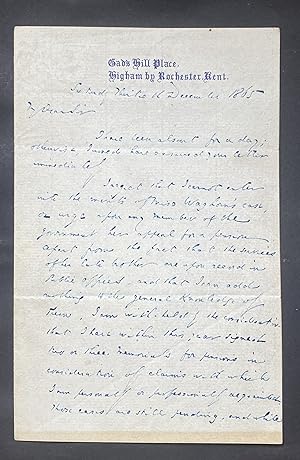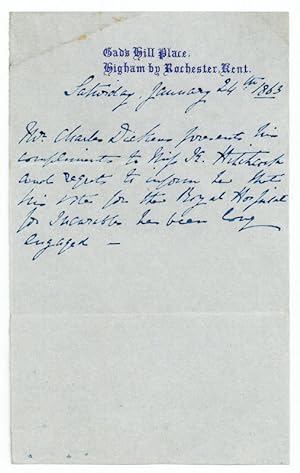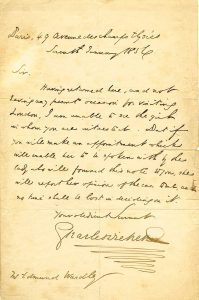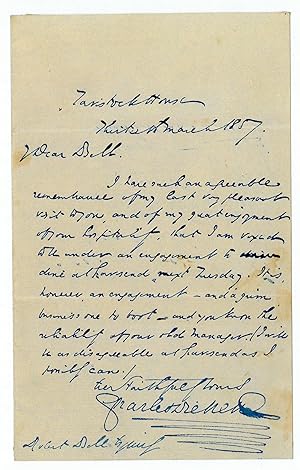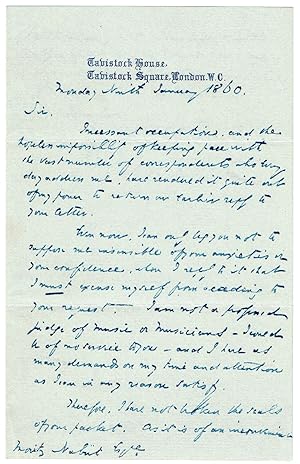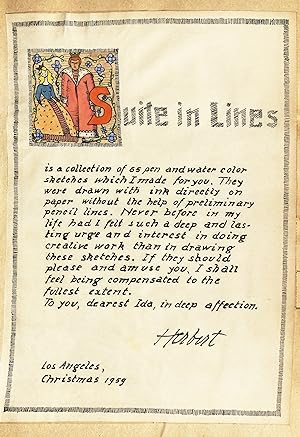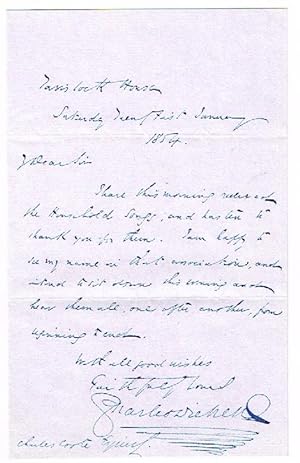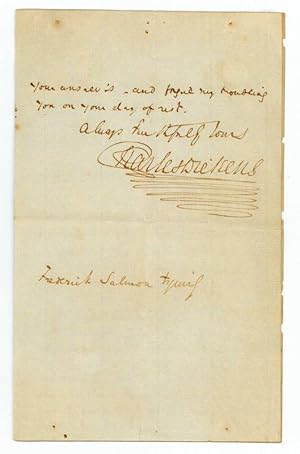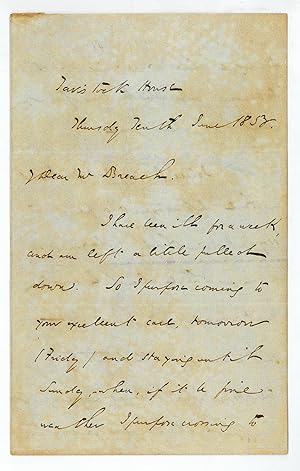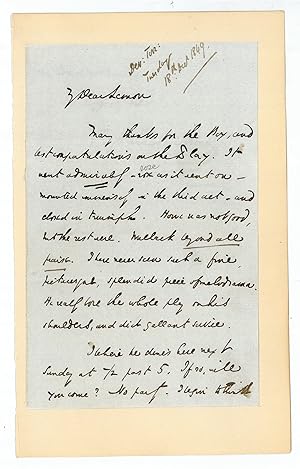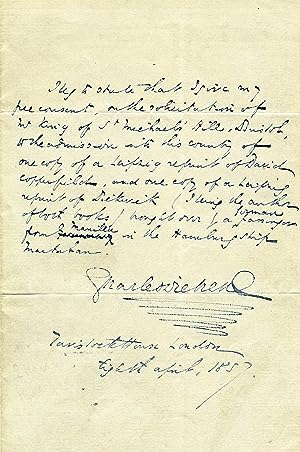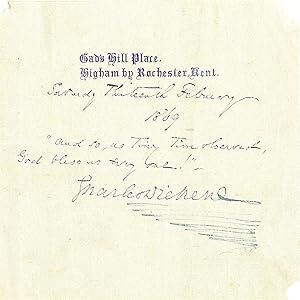Dickens: Manuscripts & Paper Collectibles, Letter (27 results)
Product Type Clear
- All Product Types
- Books (768)
- Magazines & Periodicals (3)
- Comics
- Sheet Music
- Art, Prints & Posters (2)
- Photographs
- Maps
-
Manuscripts &
Paper Collectibles (27)
Condition
- All Conditions
- New
- Used
Binding
Collectible Attributes
- First Edition (1)
- Signed (3)
- Dust Jacket
- Seller-Supplied Images
- Not Printed On Demand
Free Shipping
Seller Location
Seller Rating
-
Anarchy and organization; a letter to the left by Murray Bookchin [with] Anarchism, terrorism and individualism by Bob Dickens
Published by Friends of Malatesta, Buffalo, NY, 1969
Manuscript / Paper Collectible
Pamphlet. 7p., stapled wraps, 5.5x8.5 inches, very good condition.
-
Anarchy and organization: a letter to the left by Murray Bookchin [with] Anarchism, terrorism and individualism by Bob Dickens
Published by Friends of Malatesta, Buffalo, NY, 1970
Manuscript / Paper Collectible
Pamphlet. 7p., stapled wraps, 5.5 x 8.25 inches, small sticker scar on front wrap else very good condition.
-
[William Harrison Ainsworth, Victorian historical novelist and close friend of Charles Dickens.] Autograph Signature to valediction to letter.
Published by 'Kensal Manor House / Harrow Road. / March Four', 1843
Manuscript / Paper Collectible
See his entry in the Oxford DNB. On one side of 9 x 6 cm piece section from a letter and laid down on slightly larger and thicker piece of paper. In good condition, lightly aged. Reads: '[.] / to subscribe myself / Your faithful Servant / W. Harrison Ainsworth. / Kensal Manor House, / Harrow Road. / March Four. 1843.' See IMage.
-
Catalogue of a further portion of the well-known library the Property of the Comte de Suzannet, La Petite Chardière, Lausanne, comprising the celebrated collection of material concerning Charles Dickens which will be sold by auction by Messrs. Sotheby & Co. Monday, the 11th of July, 1938.
Published by Sotherby & Co, London, 1938
Seller: Harris & Harris Books, Clare, Suffolk, United Kingdom
Manuscript / Paper Collectible
Soft cover. Condition: Fair. No Jacket. Cream paper wraps with black lettering. 311 lots. Not illustrated, but with facsimile of some of the letters included in the sale. Wraps marked with wear, tear and some loss to spine area. Prev ownership to front cover dated '38. Text block clean.
-
[John Leech, Victorian artist and caricaturist who illustrated the Christmas Carol of Charles Dickens.] Conclusion of Autograph Letter to the poet Martin Farquhar Tupper, with Signature.
Published by No place or date
Manuscript / Paper Collectible
See the two men s entries in the Oxford DNB. The present item, is on one side of an 11 x 6.5 cm slip of paper, cut from a letter and laid down on a 12.5 x 8 cm piece of card. In good condition, lightly aged. Very slightly smudged by Leech. Reads: [.] very low. until I see / you Believe me / Yours Ever Faithfully / John Leech. / Martin . F. Tupper Esq / &c. &c. &c. See Image. Leech illustrated at least one book by Tupper ("The Crock of Gold").
-
[ God save the Quin : Frederic Quin, homeopathic physician and society figure.] Joking Autograph Letter, inviting Jesse to a dinner at Vun Undred and Vunety Vun Mount Street [.] No Dogs admitted .
Published by 111 Mount Street London. Friday evening no date
Manuscript / Paper Collectible
The present item gives an indication of the high spirits, though hardly the brilliant wit , which, according to Quin s entry in the Oxford DNB, afforded him a welcome to high society. 3pp, 16mo. Bifolium, with second leaf slightly damaged at foot by removal from mount. The body of the letter reads: Dear Jesse / Don t you or your fair friends forget Supper at Vun Undred and Vunety Vun Mount Street tomorrow Saturday night at 11 oclock or as soon after it as you can come. / N.B. "No Dogs admitted on these premises under a severe fine & penalty." / thine & my unhappy Country / God save the Quin. Longish postscript asks to know when he is likely to arrive - so that a hot dish I have ordered may not be spilt by waiting. Do you understand Eh? See image of pp.2/3.
-
2 SS. 8vo. An den Maler, Kunstautor und Sekretär der Society of Graphic Arts Frank L. Emmanuel (1865 1948): In turning over my papers, which had been sadly disarranged by the hand of a new servant, I have this morning come across a letter from you in which you convey the kind invitation of the Society of Graphic Art that I should become an Original Honorary Member. Although the communication had been opened, I fear I must have failed to read its contents or to grasp its purpose, otherwise I certainly should not have delayed in accepting this invitation and thanking the members of the Society for the honour they propose to offer me [.]". Auf Briefpapier mit gedr. Adresse.
-
[The Royal General Theatrical Fund Association, London.] Three copies of drafts of an advertisement, composed by theatre historian W. Macqueen-Pope, with copy of covering letter to Secretary J. Mayhew Allen; and later corrected draft of circular.
Published by Copy of Macqueen-Pope s letter: 15 May Circular: 27 November 1957; on letterhead of the Royal General Theatrical Fund Association 11 Garrick Street London WC2, 1953
Manuscript / Paper Collectible
See Wendy Trewin, The Royal General Theatrical Fund: a history, 1838-1988 (1989), and Macqueen-Pope s entry in the Oxford DNB. ONE: Carbon copy of letter from Macqueen-Pope to Allen, 15 May 1953, with three drafts of advertisement. 4pp, 4to. On four leaves. The letter, on the first page, is somewhat grubby, with rust spotting from paper clip, the other three leaves, each of which carries a proposed version of the advertisment, in good condition, lightly aged. The letter begins: Dear Jack Allen, / Herewith three rough samples for the proposed advertisement concerning the Fund. We should of course add the name of Leslie Henson as President, wherever you think best. I will try and knock out a few more. They are intended as basic ideas only and can be altered by the Board or discarded altogether. He is down with a sharp attack of bronchitis and is Not by any means out of the wood yet . He believes the lack of new recruits is because they do not think the Pensino good enough. People today think in very different terms of money to those we knew. And that I fear is our great problem. One draft begins: You Belong to the / Most Precarious Profession in the World / You Cannot Do Anything about that / BUT / You Can Provide for Yourself and / Face the Future. [last word deleted and replaced in MP s autograph with Years to Come ] / That is the reason for / The Royal General Theatrical Fund / It is the Profession s Own Way of / Safeguarding the Future / Get into touch with the Secretary at / 11 Garrick Street. London W.C.2 / Phone / The Younger You Join the Less You Pay / And there is a Secured Income for you at Sixty / Not only that - you never lose what you have paid in. / Youth s A Thing Will Not Endure - so Shakespeare said / but / The Royal General Theatrical Fund will take care of / Your Old Age. Another version begins You Are Young Now. Old Age Seems a Long Way off. / But is it? / You will be surprised how quietly and relentlessly it approaches. / Old Age is a serious thing to those who belong to / The Theatrical Profession. It ends [Pr]ivacy. Proficiency. Providence. TWO: Corrected draft of circular, 27 November 1957. 1p, 4to. Typewritten letter, with list of BUSINESS. Reads Dear Sir or Madam, / The usual monthly meeting of the Directors will be held here on Wednesday, 4th December, 1957, at 12 noon. / Trusting you will be able to be present, / I am, / Yours faithfully, / J. MAYHEW ALLEN, / Secretary. The BUSINESS , which include "My Fair Lady" benefit performance and Elsie Coram , have been deleted in pencil and replaced in MP s autograph with Wolfit / Robert [Ormsby?] / Peter Ustinov / Richardson / Michael Redgrave . Above this is written Mrs Long . After the body of the letter MP has written, in ink, W. Macqueen-Pope Esq . See Image.
-
[Sir Thomas Noon Talfourd, author, judge and Radical politician.] Autograph Letter Signed to T Davis Esq regarding the acting of Henry Thomas Betty, son of 'the young Roscius'.
Published by Serjeants Inn London 20 May , 1841
Manuscript / Paper Collectible
Talfourd s entry in the Oxford DNB notes that he was particularly loved by Dickens, and that he provided the archetype of the idealistic Tommy Traddles in David Copperfield; his children Frank and Kate gave their names to two youngsters in Dickens's Nicholas Nickleby. The subject of the letter is the actor Henry Thomas Betty (1819-1897), son of the young Roscius Henry Betty (1791-1874), whose entry in the ODNB also see. 1p, 4to. In good condition, lightly aged, and with slight traces of mount on reverse. Folded for postage. Begins: My dear Sir, / Mr. Henry Betty, the Son of the sometime famed young Roscius, is about to perform in your Town; - and, among other parts, proposes to try that of Thoas in my Play of "The Athenian Captive". He is a very meritorious youth; - and if you should know any play-going people (now alas! a small remnant) in the neighbourhood whom you could inspire with a wish to see him either in that or in better parts, you would very much oblige, My dear Sir, / Your s most truly / T N Talfourd . See Image.
-
[William Harrison Ainsworth, Victorian historical novelist and close friend of Charles Dickens.] Autograph Letter Signed, as editor of the New Monthly Magazine [to Alexander William Kinglake], discussing a manuscript article on a 'Russian Tour'.
Published by 'Kensal Manor House / Harrow Road. / May 19th', 1846
Manuscript / Paper Collectible Signed
The subject of this article is discussed by William M. Johnston, in his article William Kinglake s "A Summer in Russia": A Neglected Memoir of Saint Petersburgh in 1845 (TSLL, Spring 1967). The memoir was published anonymously by Ainsworth in the New Monthly Magazine, of which he was editor and proprietor, in three parts, but a German translation in the same year revealed Kinglake s identity. See the entries for Ainsworth and Kinglake in the Oxford DNB. An interesting letter, casting light on Victorian journalistic practices. 4pp, 12mo. Forty lines of text. On a bifolium. In fair condition, aged and worn, with strips of paper adhering to blank areas at head and foot of the reverse of the second leaf. Folded for postage. The recipient is not named. Signed W. Harrison Ainsworth. Begins: My dear Sir. I received your Russian Tour at breakfast this morning, and since then I have read it with great interest - an unusual instance for me, for extensive familiarity with manuscripts has not tended to increase my partiality for them. But your paper is not only well written, but very lively and amusing, and I have got through it with great satisfaction to myself. Under these circumstances you will not wonder that I gladly accept it for the New Monthly; and I only regret that I cannot, owing to the Mag[azin]e. being already made up, commence in next No. He will however send the paper incontinently to the Printer, with directions to him to forward proofs to the writer s address. He suggests dividing the paper into chapters with separate headings . He asks how he proposes to entitle it , and whether he wishes to attach his name to it. He would be pleased to make his acquaintance, and suggests that they dine at the Parthenon Club in Regent Street the following Friday, when we can talk matters over . If that is not possible, he suggests that they dine here, en famille, on Sunday next at six, likewise . See Image.
-
[Sir Thomas Noon Talfourd, dramatist, judge, and friend of Charles Lamb, dedicatee of Pickwick Papers.] Autograph Letter in the third person to Mrs Walter , presenting a copy of a little dramatic poem (i.e. his celebrated play Ion ).
Published by 21 October ; Reading Berkshire, 1835
Manuscript / Paper Collectible
It is hard to overestimate the impact of Ion on Victorian audiences in Britain and America. According to Talfourd s entry in the Oxford DNB, the play was first performed at Covent Garden Theatre, London, on his birthday, 26 May 1836. He had circulated the play privately to influential individuals, including Wordsworth, Robert Southey, and Gladstone, which ensured that the theatre was packed with the most distinguished audience contemporary reviewers could remember, including Dickens, Robert Browning, Walter Savage Landor, Pitt, Melbourne, Lord Chief Justice Denman, Lord Grey, and Lady Blessington. Ion caused a sensation and remained popular for many years. [.] The political impact of Ion was increased by the known republican sympathies of the actor in the leading role, William Charles Macready. [.] Ion was seen as a stage play of lasting stature. It was performed continuously for over a year and consistently revived in London until at least 1861. It was even more popular in the United States, where the transvestite actress Ellen Tree performed in it repeatedly. 1p, 12mo. Aged and spotted with a small lengthened hole causing loss to three words of text. Folded twice. Reads: Mr. Sergt. Talfourd presents his compliments to Mrs. Walter and takes the liberty of sending her a copy of a little dramatic [p]oem which is not published but pr[in]ted for private circulation among tho[s]e whose kindness may induce them to look indulgently on its slender claims to their attention. / Reading / 21 October 1835 . See image.
-
Charles DICKENS Lettre autographe signée Household Words & Thomas Waghorn - 1865
Publication Date: 1865
Seller: EPISTOLE, Paris, France
Manuscript / Paper Collectible First Edition Signed
Pas de couverture. Condition: Bon. Edition originale. Charles DICKENS Lettre autographe signée Household Words & Thomas Waghorn - 1865 Lettre autographe signée de Charles DICKENS (1812-1870), Gads Hill Place, Higham (Kent), 12 décembre 1865, 2 pages in-8, à son adresse, en anglais. Profitant d une demande de soutien à la pension pour Miss Waghorn, Dickens témoigne de son admiration pour le lieutenant Thomas Waghorn*, officier de marine anglais, fondateur de la route terrestre vers l'Inde et projecteur du canal de Suez, dont les services « are upon record in Public Offices ». Dickens rappelle qu il a signé cette année deux ou trois « memorials » pour des pensions qui sont toujours en attente. Il rappelle également que lorsqu il était directeur de la revue Household Words**, il a publié des articles sur les services du lieutenant Waghorn. « I have been absent for a day ; otherwise I would have answered your letter immediately. I regret that I cannot enter into the merits of miss Waghorns case, or urge upon any member of the government her appeal for a pension. Apart from the fact that the services of her late brother [Lieutenant Thomas Waghorn] are upon record in public offices, and that I can add nothing to the general knowledge of them. [ ] I have within this year signed two or three memorials for pensions in consideration of claims with which I am personnally or professionnaly acquainted. Those cases are still pending, and while they remain so, I should not consider it reasonnable to urge others [ ]. Some years ago, as conductor of Household Words I urged the services and claims attaching to Lieutenant Waghorn, as you remember ». * Thomas Fletcher Waghorn (1800 1850) was an English sailor, navy officer, and postal pioneer who promoted and claimed the idea of a new route from Great Britain to India overland through Egypt prior to the development of the Suez Canal. ** Household Words était un magazine hebdomadaire anglais publié par Charles Dickens dans les années 1850. Dickens a notamment publié "The Life and Labours of Lieutenant Waghorn." Household Words, vol 1, march 30 to sept. 21, 1850. Signé par l'auteur.
-
Autograph letter signed (in the text).
Published by Gads Hill Place, 24. I. 1863., 1863
Seller: Antiquariat INLIBRIS Gilhofer Nfg. GmbH, Vienna, A, Austria
Manuscript / Paper Collectible
8vo. ½ p. On headed paper. "Mr. Charles Dickens presents his compliments to Miss K. Hitchcock and regrets to inform her that his Vita for the Royal Hospital for Incurables has been long engaged". - Dickens had been one of the first high-profile figures to show his support for the Royal Hospital for Incurables (now the Royal Hospital for Neuro-disability) by helping to raise funds for its creation in 1854. In 1863 the hospital relocated to its permanent home, Melrose Hall on West Hill, in Putney.
-
CHARLES DICKENS ~~ WRITING FROM PARIS, ATTEMPTS TO HELP A 'FALLEN WOMEN' GET A JOB
Publication Date: 1856
Seller: Gerard A.J. Stodolski, Inc. Autographs, Bedford, NH, U.S.A.
Manuscript / Paper Collectible
No Binding. Condition: Near Fine. DICKENS, CHARLES. (1812-1870). English novelist. Autograph Letter Signed, ''Charles Dickens'' with a big, bold paraph under his signature. One full page, octavo. ''Paris, 49 Avenue des Champs-Élysées'', January 7, 1856. Fine condition. To Mr. Edmund Wardley. Dickens writes: ''Sir, Having returned here, and not having any present occasion for visiting London, I am unable to see the girl in whom you are interested. But if you will make an appointment which will enable her to be spoken with by the lady who will forward this note to you, she will report her opinion of the case to me and no time shall be lost in deciding on it. Your obedient servant, Charles Dickens''. Letters written from Dickens travels abroad are somewhat uncommon, and for the collector of Dickens, this is a fine example. The topic probably refers to Dickens work with assisting fallen women to get jobs in better positions than their former occupations, something he was devoted to, offering not only his support, but his financial backing.
-
Autograph letter signed.
Published by Tavistock House, 30. III. 1857., 1857
Seller: Antiquariat INLIBRIS Gilhofer Nfg. GmbH, Vienna, A, Austria
Manuscript / Paper Collectible
8vo. 1 p. on bifolium. To the Irish journalist and writer Robert Bell (1800-67), declining an inviation due to an unpleasant "engagement to dine at Gravesend" that same evening: "I have such an agreeable remembrance of my last very pleasant visit to you, and of my great enjoyment of your hospitality, that I am vexed to be under an engagement to dine at Gravesend next Tuesday. It is, however an engagement - and a grim business one to boot - and you know the reliability of your old manager. (I will be as disagreeable at Gravesend as I possibly can)". - Charles Dickens stayed at Gravesend from 7 to 15 April to oversee construction works at Gads Hill Place, which he had purchased in 1856. The "grim business" mentioned in the letter was probably in connection with these works. The self-designation as Bell's "old manager" is probably in reference to Dickens' role as director of the famous 1851 charity production of Edward Bulwer-Lytton's comedy "Not So Bad as We Seem, or, Many Sides to a Character". The cast included Robert Bell, Wilkie Collins, Augustus Egg, Mark Lemon, and Dickens himself. - With minor stains. - L. Litvack et al. (eds.), Charles Dickens Letters Project, Letter to Robert Bell, 30 March 1857, Dickens Fellowship, London 2016.
-
Eigenhändiger Brief mit Unterschrift.
Published by London, 9. I. 1860., 1860
Manuscript / Paper Collectible
8vo. 1 1/2 pp. Gedr. Briefkopf. An den deutschen Musiker Moritz Nabich: Incessant occupations and the hopeless impossibility of keeping pace with the vast number of correspondents who everyday address me, have rendered it quite out of my power to return an earlier reply to your letter. Even now, I can only beg you not to suppose me insensible of your anxieties or your confidence, when I reply to it that I must excuse myself from acceding to your request. I am not a professional judge of music or musician. I could be of no service to you and I have as many demands on my time and attention as I can in any reason satisfy. Therefore, I have not broken the seals of your packet. [ ]".
-
Suite in Lines". Klebealbum mit 65 mont. aquarellierten Federzeichnungen und Widmungsblatt mit kolor. Initiale und Unterschrift "Herbert".
Seller: Eberhard Köstler Autographen&Bücher oHG, Tutzing, Germany
Manuscript / Paper Collectible
Los Angeles, "Christmas 1959", 4° (25 x 19 cm). Auf 43 Karton-Blättern (diese etw. gebräunt). Pp. d. Zt. (Vordergelenk schadhaft) mit Deckelbordüre, im hinteren Innendeckel "The American Binder Company, Inc. New York Ciry". Sehr hübsche Sammlung teilweise ganzseitiger kolorierer Federzeichnungen, zum Teil mit Zirkusdarstellungen. - Das ebenfalls montierte Widmungsblatt ist an Ida Randolph Spragge (verh. Costain) gerichtet, die Gattin des Schriftstellers Thomas B. Costain, für den Ryman 1955 die Novelle "Tontin" illustriert hatte: "Suite in Lines is a collection of 65 pen and water color sketches which I made for you. They were drawn with ink directly on paper without the help of preliminary pencil lines. Never before in my life had I felt such a deep and lasting urge and interest in doing creative work than drawing these sketches. If they should please and amuse you, I shall feel being compensated to the fullest extent. To you, dearest Ida, in deep affection. Herbert." - Ryman first worked as a storyboard illustrator for MGM during Hollywood's "golden age". In 1938 he met Walt Disney as a result of an exhibit of Ryman's works at the Chouinard Art Institute.Walt was so impressed with the paintings that he invited Herb to join the Walt Disney Studios (Burbank). Herb went on to serve as an art director for such feature-length animated films as Fantasia and Dumbo. During the summers of 1949 and 1951, Ryman took a leave of absence and travelled with the Ringling Bros. and Barnum & Bailey Circus, living among the performers and documenting the circus in his paintings. 1953 Disney asked Ryman to render the artwork for a Disney envisioned theme park. Disney and Ryman worked non-stop throughout the weekend creating a large pencil sketch and several other drawings illustrating the project, including the Sleeping Beauty Castle, Main Street, USA, Jungle Cruise and Pirates of the Caribbean. - Vgl. D. Mumford and B. Gordon, A Brush with Disney [.] Told through the words and works of Herbert Dickens Ryman. 2000. Gewicht (Gramm): 1000.
-
Autographed letter signed ("Charles Dickens").
Published by Tavistock House, 21 January 1854, 1854
Manuscript / Paper Collectible
8vo. 1 page. To Charles Coote. Dickens gratefully acknowledgingHousehold Songs .I am happy to see my name in that association, and intend to sit down this evening and hear them all, one after another, from beginning to end".
-
Autographed letter signed ("Charles Dickens").
Published by Devonshire Terrace, 6 June 1850, 1850
Manuscript / Paper Collectible
8vo. 1 page. In French to Francois Régnier informing that he has not invited Augustin Eugène Scribe for dinner because of his wife's ill health, but hoping that Regnier willvisit.
-
Autograph letter signed ("Charles Dickens").
Published by Windsor, 7 Nov. 1841., 1841
Seller: Antiquariat INLIBRIS Gilhofer Nfg. GmbH, Vienna, A, Austria
Manuscript / Paper Collectible
8vo. 2¾ pp. on bifolium. To Dr. Frederick Salmon complaining of some aches and pains. Dickens and his wife went to stay at the White Hart Hotel in Windsor on November 6th, the day after Dickens completed his novel "Barnaby Rudge". The trip was meant to provide some rest and relaxation for Dickens who had completed "The Old Curiosity Shop" and "Barnaby Rudge" back to back, and had recently undergone major surgery. Dr. Frederick Salmon had performed surgery on Dickens in October of 1841 for a fistula of the rectum, a procedure for which Salmon was renowned. In this letter, Dickens' describes his pain and references the operation with his typical wit, noting "all manner of queer pains were floating about my illustrious person [.] now (but not often) shooting through that region which you have made as tender as my heart [.]". Dickens tells his doctor that he is feeling "immeasurably better" and asks whether Salmon would like to make his follow up visit tomorrow rather than Tuesday. - Light soiling to creases; evidence of removal of wax seal. Property from a Private Chicago-area Collection. Provenance: The Comte Alain de Suzannet Dickens Collection Sold: Sotheby's, London, November 22-23, 1971.
-
Autograph letter signed ("Charles Dickens").
Published by Tavistock House (London), 10. VI. 1853., 1853
Seller: Antiquariat INLIBRIS Gilhofer Nfg. GmbH, Vienna, A, Austria
Manuscript / Paper Collectible
8vo. 2½ pp. on bifolium. To Mr. Breach, the proprietor of the Folkestone Inn, where Dickens stayed for three days while travelling to Boulogne-sur-Mer on Sunday, June 12th. Dickens mis-dated this letter as, according to another letter in the VanderPoel Dickens collection (A85) written from Folkestone dated Saturday the 11th, this letter, written on Thursday, would have been the 9th of June. In his letter Dickens asks the proprietor to have a "quiet and cheerful" room prepared for him and his family who plan on coming for the summer. Dickens was particularly fond of Boulogne as, the previous summer, he had completed two chapters of "Bleak House" while vacationing there. - Minor overall toning; brown spot to upper middle crease. - Provenance: from a Chicago-area private collection. - Edgar Johnson, 756-759; The VanderPoel Dickens Collection, A85.
-
Autograph letter signed.
Published by [London], 18. XII. 1849., 1849
Seller: Antiquariat INLIBRIS Gilhofer Nfg. GmbH, Vienna, A, Austria
Manuscript / Paper Collectible
8vo. 1½ pp. on bifolium. To the English journalist and writer Mark Lemon (1809-70) with congratulations on his play, praising particularly the performance of the English actor James William Wallack (ca. 1794-1864), who dines at his place the following Sunday, a dinner he invites Lemon to join: "Many thanks for the Box, and best congratulations on the Play. It went admirably - rose as it went on - mounted immensely in the third act - and closed in triumph. Howe was not good, but the rest were. Wallack beyond all praise. I have never seen such a fine, picturesque, splendid piece of melodrama. He really bore the whole play on his shoulders, and did gallant service. I believe he dines here next Sunday at ½ past 5. If so, will you come? No party. I begin to think you live in Australia [.]". - Mounted on backing paper.
-
Autograph letter signed Charles Dickens".
Published by Devonshire Terrace, 13 July 1848, 1848
Manuscript / Paper Collectible
8vo. 2 pp. Laid-down, staining from an old mount at the edge. To the composer and performer John L. Hatton, regretting that he has "not the least knowledge of any musical person in America"; adding that he is happy offering testimony to his "merits as an accomplished musician and composer, and as one whom he would much desire to see employed at home here in the lucrative exercise of his knowledge and abilities, as to have no leisure for 'fresh fields and pastures new'". Dickens writes a testimonial on behalf of the composer and performer John Liptrot Hatton, who was about to undertake a tour of the United States: 'In August 1848 [Hatton] first visited America, remaining there until the spring of 1850, when he returned in order to accompany Sims Reeves on a tour; he went again to America in the following September. His playing and singing were alike admired, and he introduced some of Mendelssohn's music to the Boston public. At no time was he troubled by artistic scruples, and it was often uncertain whether the place allotted to him in the programme would be occupied by one of Bach's fugues or by a comic song of his own composition. It is said that his hearers were delighted with a song called "The Sleigh Ride," in the course of which he produced "realistic" effects by means of bells tied to his leg' (J. A. F. Maitland, DNB). See the Pilgrim edition of The Letters of Charles Dickens, volume 5, 1981, p. 382.
-
CHARLES DICKENS -- OLIVER TWIST -- WRITING ABOUT THE SERIAL PUBLICATION OF OLIVER TWIST IN BENTLEY'S MISCELLANY ~~ FROM HIS EARLY 48 DOUGHTY STREET, LONDON RESIDENCE ~~ WHERE THE MANUSCRIPT WAS WRITTEN
Publication Date: 1838
Seller: Gerard A.J. Stodolski, Inc. Autographs, Bedford, NH, U.S.A.
Manuscript / Paper Collectible
No Binding. Condition: Fine. DICKENS, CHARLES. (1812-1870). English novelist. Superb early, Autograph Letter Signed, ''Charles Dickens''. One full page, quarto. 48 Doughty Street, London, January 19, 1838 . To Thomas Lydely. Neatly inlaid into a larger leaf. Integral [on the verso], is a postal leaf, addressed and signed in full by Dickens. The 48 Doughty Street location from where this letter was written is important, and is now the CHARLES DICKENS MUSEUM, which was Dickens home from 1837 1839. Charles and his bride, Catherine, along with his sister-in-law Mary Hogarth, lived here a year after his marriage. It is the only surviving London house owned by Dickens, where he worked on his early tales. During this time, he would serialize Oliver Twist, to be first published in Bentley s Miscellany, a British monthly magazine, starting February 1837, through April 1839. Charles Dickens was its first editor. Oliver Twist first appeared in Bentley s as part of his serial ''The Mudfog Papers.'' In this letter to Thomas Lydely, of the Worcester Herald, in which Dickens has stricken the word Herald, and replaced it with Office , Dickens remarks on the ''Irish Tale,'' which was presumably at Bentley s, and alludes to plot details in upcoming issues of Oliver Twist. The letter in full: ''I write to you very briefly, to save the Post. I shall be very happy to avail myself of the Temptation which has only been delayed by a great press of matter, and which you will see at all in the March Number, [The introduction of Monks] unless something extraordinary should occur to prevent it. The 'Irish Tale' I should imagine must be at Bentley s. Depend on it that either his people or those at Peel s have made some mistake. It was returned to one or another place from here, but my brother shall enquire into it. I shall be glad to receive the refusal of your papers, and am, Very Truly Yours, Charles Dickens.'' Oliver Twist would be the only work published by Bentley s and because of disagreements with Richard Bentley, Dickens resigned his position as editor in February 1839. Bentley separately published Dicken s Oliver Twist the year this letter was written with the title ''Oliver Twist; or, The Parish Boy s Progress, by Boz.'' What the Irish Tale Dickens refers to here remains elusive. Letters written from this early period of Dickens life are almost unobtainable, and those with significant content and reference to his major writings at this time are even more so. Just an exceptional letter.
-
DICKENS GIVES PERMISISON FOR THE IMPORTATION INTO THE UNITED KINGDOM OF ONE COPY EACH OF THE GERMAN EDITIONS OF HIS: ''DAVID COPPERFIELD'' AND ''THE PICKWICK PAPERS''
Publication Date: 1857
Seller: Gerard A.J. Stodolski, Inc. Autographs, Bedford, NH, U.S.A.
Manuscript / Paper Collectible
No Binding. Condition: Fine. DICKENS, CHARLES. (1812-1870) English novelist of the Victoria era. Autograph Statement Signed, ''Charles Dickens'', with a big bold paraph under his signature. One page, octavo. ''Tavistock House, London, Eight April, 1857''. Dickens writes: ''I beg to state that I give my free consent, on the solicitation of Mr. King of St. Michael s Hill, Bristol, to the admission into this country, of one copy of the Leipzig reprint of David Copperfield, and one Copy of a Liepzig reprint of Pickwick (I being the author of both books) brought over by a German passenger from Germany Manilla [sic] in the Hamberg ship Martahan Charles Dickens''. During Dickens visit to the United States in 1842, he campaigned vigorously for an international copyright law. He realized that he had lost income when his The Pickwick Papers was published in the US in 1837 by publishing pirate firms. On this visit, he met with Henry Clay, Daniel Webster and even President John Tyler to press the need for an international copyright. Under the British Copyright Act of 1842; that law provided for the copyright period to last for the lifetime of the author plus 7 years, or for 42 years from first publication, whichever was longer. In this signed statement, Dickens is acknowledging, and allowing for the importation into the UK of a German edition of his works. He was thus ensuring that his hard earned efforts in establishing copyright protections were being met in this way. A very fine letter. Any mention, of any of his better know works, merits special consideration by the serious collector. When two of his greatest works are mentioned in the same letter, then that is a letter of very special qualities indeed!.
-
Early autograph letter signed 1841 to the Lord Provost of Edinburgh, Scotland
Published by June 1841, 1841
Seller: N V Books, Alcester, United Kingdom
Manuscript / Paper Collectible Signed
Hardcover. Condition: Near Fine. 'Believe me, my Lord, that I am deeply sensible of this high token, and that I shall ever regard the title with a pride and pleasure much too deep for words.' A letter in which a young Charles Dickens writes from the Royal Hotel, Edinburgh, expressing his gratitude to the Lord Provost of Edinburgh (Sir James Forrest) for the distinguished honour of granting the young novelist the freedom of the city in June 1841. Claire Tomalin writes 'He left an unseasonably cold London to travel north with Catherine, to a warm and enthusiastic welcome. Crowds gathered round their hotel, and over 250 gentlemen attended the public dinner in his honour' ( Charles Dickens, A Life - Viking 2011) 1 page, 7 x 4.5 inches, in excellent, near fine condition, with a main crease through the centre and the remains of a small area of guard to the reverse where it was formerly mounted in a Victorian album. A unique letter displayed in a removable leather frame which is itself housed in a custom full morocco solander box. The box is complete with gilt lettering and a gilt Scottish thistle motif. Signed by Author(s).
-
THE HOLY GRAIL FOR ALL CHARLES DICKENS COLLECTORS! ~~ A SIGNED AUTOGRAPH QUOTATION FROM: 'A CHRISTMAS CAROL': ''AS TINY TIM OBSERVED, GOD BLESS US EVERY ONE!'' -- ACCOMPANIED BY A LETTER OF TRANSMITTAL FROM WILKIE COLLINS
Publication Date: 1869
Seller: Gerard A.J. Stodolski, Inc. Autographs, Bedford, NH, U.S.A.
Manuscript / Paper Collectible
No Binding. Condition: Fine. DICKENS, CHARLES. (1812-1870). English novelist of the Victorian era; his numerous beloved works include: A Christmas Carol , A Tale of Two Cities Barnaby Rudge , Bleak House , David Copperfield , Dombey and Son , Great Expectations , Martin Chuzzlewit , Nicholas Nickleby , Oliver Twist , The Old Curiosity Shop , and The Pickwick Papers . Simply superb Autograph Quotation Signed, "Charles Dickens", being the most famous quotation from his timeless Christmas classic: A CHRISTMAS CAROL, penned on his imprinted Gad s Hill Place, Higham by Rochester, Kent stationery, with a bold paraph under his name. One page, small square octavo. [approx. 4 1/5 x 5 inches]. Tiny paper loss in 2 corners, else excellent condition. Saturday, 13th February 1869 . Dickens writes: ''and so as Tiny Tim observed God bless us every one! Charles Dickens'' This most remarkable quotation is accompanied by a letter from Wilkie Collins wherein he notes sending the quotation, to a Mrs. Richard . COLLINS, (WILLIAM) WILKIE. (1824-89). Noted English novelist and playwright known especially for The Woman in White (1859), a mystery novel and early "sensation novel", and for The Moonstone (1868), which has been proposed as the first modern English detective novel. Excellent Autograph Letter Signed, Wilkie Collins , full page, octavo. 90, Gloucester Place, Portman Square, W. [London], February 13, 1869. Laid down to a heavier paper stock, else fine condition. Collins writes: Dear Mrs. Richard, Here is a line from The Christmas Carol , copied, dated, and signed by Dickens. I shall be sorting some old letters before long and if I find any autographs of celebrities , you shall have them. Very truly yours, Wilkie Collins . We can add nothing more to this, except to say: Exceeding rare, Exceedingly choice, and simply One of our Best of the Best .


![Seller image for Anarchy and organization; a letter to the left by Murray Bookchin [with] Anarchism, terrorism and individualism by Bob Dickens for sale by Bolerium Books Inc.](https://pictures.abebooks.com/inventory/md/md30759852580.jpg)
![Seller image for Anarchy and organization: a letter to the left by Murray Bookchin [with] Anarchism, terrorism and individualism by Bob Dickens for sale by Bolerium Books Inc.](https://pictures.abebooks.com/inventory/md/md30836400189.jpg)
![Seller image for [William Harrison Ainsworth, Victorian historical novelist and close friend of Charles Dickens.] Autograph Signature to valediction to letter. for sale by Richard M. Ford Ltd](https://pictures.abebooks.com/inventory/md/md31759816247.jpg)
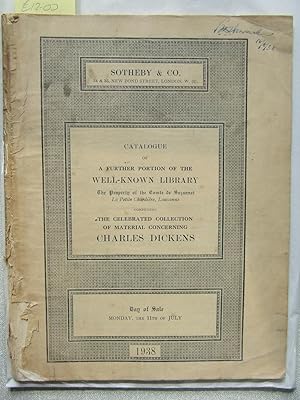
![Seller image for [John Leech, Victorian artist and caricaturist who illustrated the Christmas Carol of Charles Dickens.] Conclusion of Autograph Letter to the poet Martin Farquhar Tupper, with Signature. for sale by Richard M. Ford Ltd](https://pictures.abebooks.com/inventory/md/md31717327930.jpg)
![Seller image for [ God save the Quin : Frederic Quin, homeopathic physician and society figure.] Joking Autograph Letter, inviting Jesse to a dinner at Vun Undred and Vunety Vun Mount Street [.] No Dogs admitted . for sale by Richard M. Ford Ltd](https://pictures.abebooks.com/inventory/md/md31241937121.jpg)
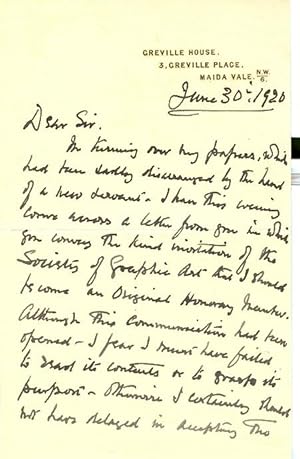
![Seller image for [The Royal General Theatrical Fund Association, London.] Three copies of drafts of an advertisement, composed by theatre historian W. Macqueen-Pope, with copy of covering letter to Secretary J. Mayhew Allen; and later corrected draft of circular. for sale by Richard M. Ford Ltd](https://pictures.abebooks.com/inventory/md/md31686041153.jpg)
![Seller image for [Sir Thomas Noon Talfourd, author, judge and Radical politician.] Autograph Letter Signed to T Davis Esq regarding the acting of Henry Thomas Betty, son of 'the young Roscius'. for sale by Richard M. Ford Ltd](https://pictures.abebooks.com/inventory/md/md31751063321.jpg)
![Seller image for [William Harrison Ainsworth, Victorian historical novelist and close friend of Charles Dickens.] Autograph Letter Signed, as editor of the New Monthly Magazine [to Alexander William Kinglake], discussing a manuscript article on a 'Russian Tour'. for sale by Richard M. Ford Ltd](https://pictures.abebooks.com/inventory/md/md31759821055.jpg)
![Seller image for [Sir Thomas Noon Talfourd, dramatist, judge, and friend of Charles Lamb, dedicatee of Pickwick Papers.] Autograph Letter in the third person to Mrs Walter , presenting a copy of a little dramatic poem (i.e. his celebrated play Ion ). for sale by Richard M. Ford Ltd](https://pictures.abebooks.com/inventory/md/md31294864485.jpg)
